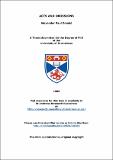Acta and omissions
Abstract
I identify and examine the grounds on which we describe an
agent's non-doing as an omission to do X, and a cause of Y. I
distinguish between the formal and material aspects of an omission.
This is useful in setting aside obvious differences between actions
and omissions, which some writers take to be significant, in
particular the view that an omission can be identified with whatever
action an agent performs or movement he makes when he omits to X. In
fact, he need not make a bodily movement, perform some other action in
order to prevent himself from doing X, or decide not to perform X. It
is by no means certain that any omission is timeable, and most are
certainly not. I note difficulties for any account of intention that
is meant to embrace intentional omissions as well as actions. I do
not offer a single, all-embracing account of omissions, because I
think it is impossible to provide one.
I acknowledge the importance of the role of expectation in
identifying omissions, particularly as causes, but argue that there
are sorts of omissions which are not identified by the presence of
defeated expectation. I take the view that some omissions are in an
important way indistinguishable from actions and may therefore be
regarded as causes. Also that some non-doings which are not omissions
may be regarded as causes. I criticise the ability of traditional
analyses of causality to comprehend the possibility of omissive
causation and expound alternative accounts of what constitutes a cause in order to do justice to that possibility. I find useful Collingwood's account of what it is to speak of causality in terms
appropriate to a practical natural science; that is, in the language
of means and ends.
Type
Thesis, PhD Doctor of Philosophy
Collections
Items in the St Andrews Research Repository are protected by copyright, with all rights reserved, unless otherwise indicated.
Related items
Showing items related by title, author, creator and subject.
-
Report to the dancefloor : journeys by experience and writing into raving and anthropology
Reeves, Barry (University of St Andrews, 1998) - ThesisThis work is an ethnography about raving. As such, it is based on the author's actual, inter-subjective and historical experience of that contemporary international social phenomenon in Britain and in Goa (India) during ... -
Pulse dipolar EPR reveals double-histidine motif CuII-NTA spin-labelling robustness against competitor ions
Wort, Joshua; Arya, Swati; Ackermann, Katrin; Stewart, Alan J.; Bode, Bela Ernest (2021-03-25) - Journal articlePulse-dipolar EPR is an appealing strategy for structural characterization of complex systems in solution that complements other biophysical techniques. Significantly, the emergence of genetically encoded self-assembling ... -
Psychological factors predicting health behaviour : the response to risk factor screening for cardiovascular disease
Simpson, Wendy M. (University of St Andrews, 1996-07) - ThesisThe two main aims of this thesis were first, to predict health behaviour and, second, to apply and test the existing psychological theories in this field. The health behaviours concerned were the responses to screening for ...

